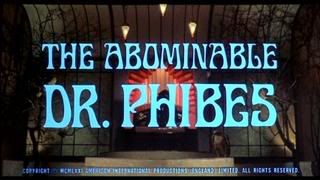
PLOT:
Anton Phibes (Vincent Price) is quite the renaissance man. Not only is he a doctor of music and theology, but he's also a famous organist and has a beautiful wife whom he adores. Yep, life is pretty good. At least until Phibes is disfigured in a car crash when rushing home to his sick wife, who ends up dying on the operating table. Phibes, blaming the doctors for his wife's death, decides to murder each with complicated schemes based on the 10 plagues visited upon Egypt by God in the Old Testament. He saves his final punishment (killing the first-born! Natch!) for Dr. Vesalius (Joseph Cotten), the head doctor in his wife's operation, who is forced to operate on his son while a container of acid hangs overhead. Also, Phibes has a clockwork orchestra, and a beautiful, silent female assistant. For some reason.
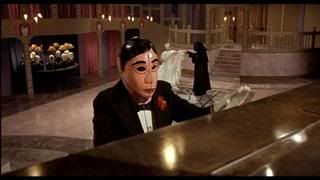
REVIEW:
I've never quite understood the aesthetic of "camp". Certainly, I recognize it when I see it. In the exaggerated stilted dialogue and rainbow sets of the 60's Batman television series, or in the caricatured performances and music of John Water's films, but camp value often seems to come from the perspective of the viewer. Should camp always be intentional like in those cited examples? Is it the realm of drag-queens and Paul Lynde? Or, is it traditional movie-making with the volume turned up?
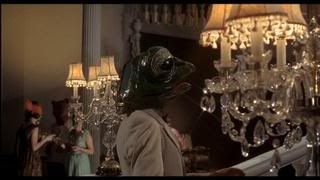
The humor in The Abominable Dr. Phibes is certainly intentional, and it's obvious that director Robert Fuest is well aware of the ridiculous excesses onscreen. What is strange about the camp aspects of Phibes is how they mix with rather traditional elements of british humor (in the form of the antics of the police force) and the sometimes gruesome horror elements. Phibes is a sympathetic creature, a man whose love for his wife and grief over her loss has been driven mad. But his revenge plot is astoundingly complicated to the point of being silly. The odd elements (liks his mute servent and clockwork orchestra) serving to underline the fun.
Vincent Price is the camp figure of this piece, and while his performance isn't restrained, it's also not blatantly over the top in a Frank-N-Furter (or, even his appearances as Egghead on Batman) sort of way. Joseph Cotton doesn't get a lot to do, but his eventual face-off with Phibes is a lot of fun and he makes a convincing doctor. More active in the plot is Peter Jeffrey as Inspector Trout, though his investigations often cross over into "hijinx" territory, even down to other characters mistaking his last name for various other fish.
There's a rather odd decision to rob Vincent Price of his distinctive voice for most of the film, and indeed the first ten minutes of the film features no dialogue at all. Phibes is only able to speak through machinery, and even then only in stilted form. Still, this method of communication gives emphasis to Price's booming voice when it is heard, his threats blaring through loudspeakers.

Phibes is presented as a tragic, sympathetic character, though the motivation behind his revenge is never explored very deeply. His hatred and anger at the doctors who operated on his wife would be more understandable if there was evidence of some sort of negligence on their part. Still, he isn't motivated by greed or general malice, and wishes only to rest in peace after his revenge is complete. (Apparently not TOO peacefully, however, since a sequel to the film; Dr. Phibes Rises Again, was released a year later.)
The violence in the film is actually quite ingenious, and the colorful way in which Phibe's rivals are dispatched are reminiscent of the later italian giallos and horror films of Dario Argento (and the Mario Bava films of the time). A personal favorite is the gentleman whom Phibes bleeds dry, leaving bottles of blood on the mantle next to his drained corpse. Certainly a gruesome idea, but isn't played for significant amounts of tension or horror. More disturbing is the fate of the nurse, who Phibes coats in a slimy vegetable extract before covering her with locusts who proceed to eat her flesh. Icky.
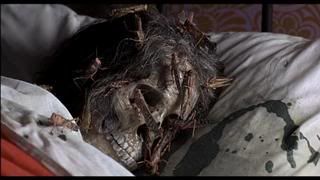
MGM provides the DVD for The Abominable Dr. Phibes in a beautiful widescreen anamorphic 1.85:1 print that looks terrific. A film this reliant on outrageous visuals benefits greatly from the clean, colorful image.
Unfortunately the only other extra afforded is the film's original theatrical trailer which oddly reveals Phibes face. Considering the impressive make-up is saved until the end of the film itself, it seems strange that they would give it away in the advertising. It's appearance is a memorable moment in horror history, and still remains rather chilling.
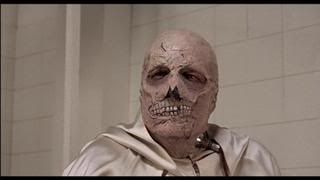
The Abominable Dr. Phibes is an amusing black comedy with a startling performance by Vincent Price at its centre. The murders are suitably inventive, though rarely gory and often played for humor rather than straight chills. Worth pairing up with the similarly themed Theater Of Blood.










3 comments:
Great write-up.
I'll use a wrestling analogy to describe campy movies. Dwayne Johnson once said that The Rock was really him (Dwayne) living at full blast. Campy film is similiar, IMO. Imagine all of the crazy, off-the-wall things you would do if this neurotic world would allow it.
Where's the craziest place you'd visit? The most outrageous outfit you'd wear? The most exotic food you'd eat? Would you make up your own language? How would exact revenge upon those who hurt you?
Camp is the manifestation of all those elements that you would act upon if life was truly a no-holds barred event. It provides us with a cheeky, silly, and thought-provoking look into the absurd while making us wonder if living 'normally' is really the absurd side of life. Maybe camp is what we should strive for. Because who would know if we're being serious?
Imagine all the stuff you could do under the guise of being a camp character. Like a court jester telling the king that he's stupid, but in the form of a joke so he won't lose his head. Campy folk are more realistic than the so-called straight living crowd. They're funnier, too.
The key is not to take yourself too seriously inside camp, because you'll lose your mind for sure. You can't do it on purpose--you just go full tilt, without a care in the world. Camp is living freely in a society that actually appreciates free will.
Can you tell I like campy things? :-)
can I help write for this? I had no idea you guys were still around...
Christ, Travis, you're half the reason this thing exists in the first place. I actually tossed you a message a few weeks back (after some snooping to track you down) to see if you would be interested. Toss me an e-mail and i'll get you the particulars and add you to the e-mail list.
Post a Comment